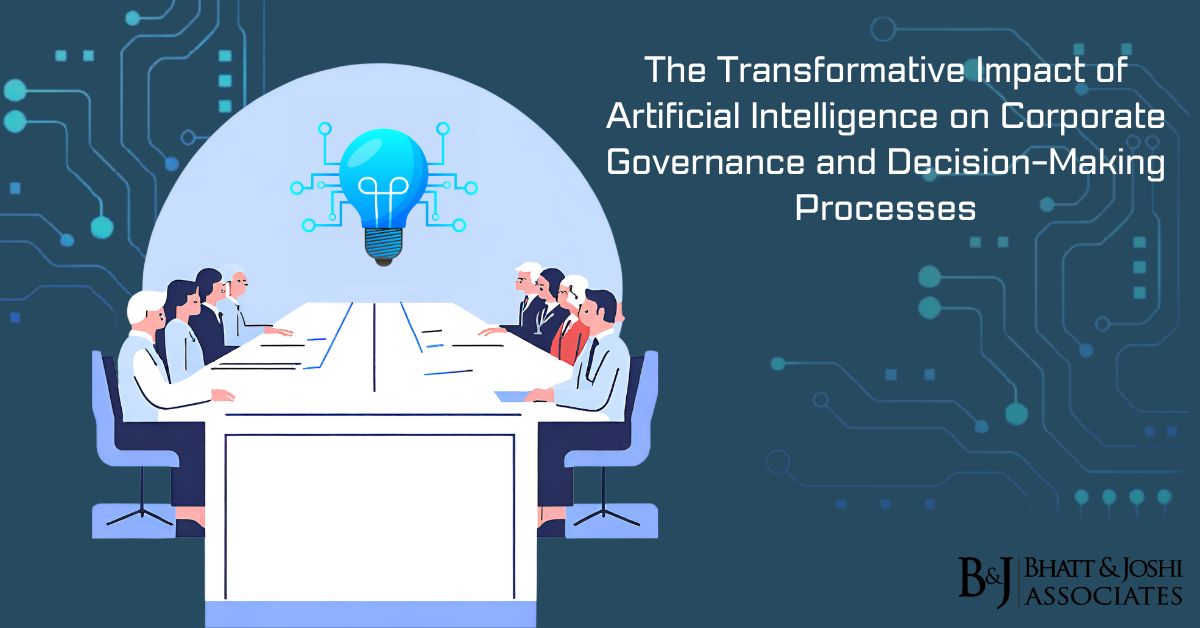Introduction
In the ever-evolving landscape of business, marked by perpetual innovation, the emergence of Artificial Intelligence (AI) stands as a paradigm-shifting development. Originally conceived as a mere figment of science fiction, AI has transcended its speculative origins to become a tangible force shaping the contours of the twenty-first-century business landscape. This article endeavors to delve deeply into the profound implications of AI’s ascendance on corporate boardrooms and decision-making processes, scrutinizing its multifaceted effects on corporate law, governance, and operational dynamics.
Operational Role of Corporate Board
At the helm of every company lies the Board of Directors (BOD), a collective entity vested with the solemn responsibility of steering the organization’s strategic course and ensuring operational efficacy. Acting as custodians of corporate governance, directors shoulder the weighty mantle of overseeing day-to-day operations, safeguarding stakeholder interests, and adhering to regulatory frameworks delineated in statutes like the Companies Act, 2013, and the company’s Articles of Association (AOA). In essence, the BOD serves as the linchpin of corporate governance, orchestrating a symphony of managerial acumen, fiduciary duty, and strategic foresight.
Functions of Directors in a Company
Within the intricate tapestry of corporate governance, directors assume multifarious roles and responsibilities tailored to the exigencies of modern business paradigms. Executive Directors, the stalwarts of operational prowess, navigate the labyrinthine complexities of daily operations, while Non-Executive Directors, imbued with a wealth of external expertise, offer invaluable insights and oversight to strategic decision-making processes. Together, they form the fulcrum upon which organizational success hinges, orchestrating a delicate balance between operational efficiency, strategic vision, and stakeholder stewardship.
The Influence of Artificial Intelligence on Corporate Governance and Decision-Making
Against this backdrop of corporate dynamism, AI emerges as a disruptive force, heralding a new era of efficiency, insight, and innovation within boardroom deliberations. By harnessing the power of machine learning, data analytics, and predictive modeling, AI empowers directors to transcend the constraints of human cognition, augmenting decision-making processes with unprecedented levels of precision and foresight. This transformative shift permeates every facet of corporate governance, from strategic planning and risk mitigation to regulatory compliance and stakeholder engagement.
Impact of AI on Decision-Making Processes
In the crucible of corporate decision-making, AI catalyzes transformation, revolutionizing the very fabric of strategic discourse and operational efficiency. By automating mundane tasks and sifting through voluminous datasets, AI liberates directors from the shackles of administrative drudgery, enabling them to focus their cognitive faculties on tasks that demand nuanced judgment and strategic insight. Moreover, AI’s predictive capabilities offer a roadmap for navigating uncertainty and complexity, empowering directors to make informed decisions grounded in empirical evidence and probabilistic analysis.
Legal Considerations: Navigating Artificial Intelligence Integration in Corporate Governance
However, amidst the fervor of AI’s ascent, legal and ethical considerations loom large, casting a shadow of uncertainty over the role of automation in corporate governance. While AI holds the promise of enhancing decision-making efficacy, existing legal frameworks mandate human directors to uphold fiduciary duties and accountability. Moreover, the absence of legal personhood precludes AI from assuming directorial roles or bearing liabilities under prevailing statutes. Thus, the integration of AI into boardroom settings necessitates a delicate balancing act, wherein the imperatives of efficiency and innovation are tempered by the imperatives of legal compliance and ethical stewardship.
Conclusion: Embracing Artificial Intelligence in Corporate Governance
In conclusion, the advent of AI represents a watershed moment in the annals of corporate governance, heralding a new epoch of efficiency, insight, and innovation. Yet, this transformative journey is fraught with legal and ethical complexities, necessitating a judicious approach to AI integration guided by principles of accountability, transparency, and ethical stewardship. By embracing AI as a facilitator rather than a panacea, businesses can navigate the turbulent waters of corporate decision-making with poise and purpose, leveraging automation to augment human judgment and strategic foresight in pursuit of organizational excellence and stakeholder value creation.














